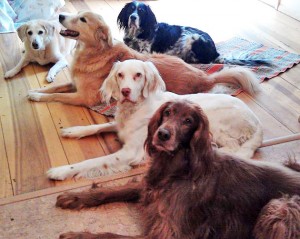Mythbusters, the Dog Training Edition: “Some Breeds Need a Firmer Hand”
Breed specific enthusiasts can have a narrow view on some aspects of their chosen breed. This is not limited to any one breed. I see it among many breed enthusiasts. Everyone wants to believe that their breed is more special than any other breed. So they say things like the above phrase to set their breed apart and in doing so, themselves as well. After all, they can handle this breed so they must be special too.
In truth, all dogs are special. There no need to make any one breed seem tougher than any other breed. To do so invites abuse of that breed in the name of training. This is unnecessary at best. It is a crime at worst.
Behavior is behavior. Modifying a behavior can be done with reward based methods regardless of the breed. Breed only matters in knowing where some behaviors MAY come from and in how to redirect them more effectively. Plenty of breeds were bred for a certain job. But that never guarantees that every member of that breed has that working instinct. It very much depends on the individual parents. But knowing what that job trait may be and how certain behaviors fit into such a trait are important considerations for behavior consultants. That doesn’t however, change the methodology that one should use to modify errant behaviors that are unwelcome. There are plenty of choices on how to implement reward based behavior modification.
In fact, using punitive methods on strong confident dogs can create a time bomb waiting to go off. At some point, said strong confident dog will get sick of being forced and choose to fight back. Is this the kind of relationship that you want to create with your dogs? I sure don’t. All of my confident dogs have flourished when I finally got a clue about how to inspire them effectively.
Status breeds can often the choice of some people who want to use the perceived status of their dog to elevate how they are viewed by the world at large. Being able to “control” such a “tough” dog makes them tough. So they use methods popularized by a certain TV “trainer” with little education in dog behavior. These old fashioned methods have proven to be detrimental to having a trust based relationship with one’s dog. They also often create more aggression and a defensive state of existing in the dogs in question.
Among the fallacies I have heard are that Pit Bulls have necks so strong that they can’t feel prong collars and their jaws lock so that you have to be forceful with them in order to prevent that. Of course this kind of false information creates an adversarial situation with a breed group that is already in a precarious position in the public eye right now. The truth is that this is one of the breed groups that is the softest with humans. They are often eager to please and take to reward based training very quickly. Thankfully most Pit Bull rescue and advocacy groups operate with modern methods these days, although sadly not all do. Do your research before supporting a Pit Bull rescue and choose the ones who choose to train with their brains. Without that reassurance, you can inadvertently support very old fashioned methods that rely on abuse and call it training.
Dobermans and Rottweilers are two more breeds where you often see a heavy slant towards the old fashioned methods among their fanciers. Progressive owners choose positive rewards-based methods because they work better, without a need for manhandling one’s dog. Merlin introduced me to the Doberman world and fortunately for him, I wound up on the path to reward-based training. I wish I could say the same for most Doberman fans.
Fortunately for Caucasian Ovcharkas, Kenzo’s breed, the original breeder in this country who wrote the book on the breed, was ahead of her time. Reward-based training and even capturing, is mentioned in her book on the breed. Unheard of that decade, this is a boon to the breed. This breed tends to be the picture that shows up on the internet if you google aggressive dogs. Large and powerful, yet perfectly easily trainable with reward based training, once again.
The same is true of all breeds. Behavior is behavior. Expecting to have to be forceful with your chosen breed sets up an adversarial relationship from the start. This causes defensive behavior on the part of the dog and resentful behavior on the part of the human. If you choose to see believe that you have to use a hammer, you will see everything as a nail. Build a relationship, not a battle. If you have a breed perceived as “tough”, feel free share your reward based training path in the spaces below.
Posted in: Projects
Leave a Comment (7) →



